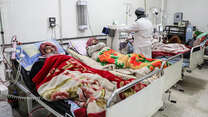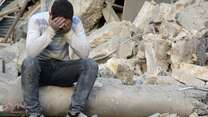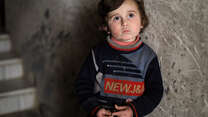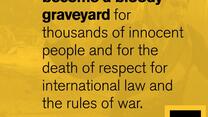Editor's Note April 14: After some of the bloodiest fighting in more than seven years of civil war in Syria—including a suspected chemical attack in the town of Douma—the enclave of Eastern Ghouta is under the control of the Syrian government. Here’s what you need to know.
To avoid death in Eastern Ghouta, one had to go underground.
Since aerial assaults intensified in this suburb of Damascus on Feb. 18, many residents have moved into basements or other underground shelters, in order to escape the bombardment, which has killed more than 1,700 civilians and injured over 5,000.
But residents seeking safety in basements are still vulnerable to poisonous gases. A suspected chemical weapons attack carried out in the town of Douma—the last town controlled by armed groups in the area—has reportedly claimed more than 70 civilian lives.
"The use of chemical weapons is against international humanitarian law, and if verified, amounts to a war crime," says International Rescue Committee vice president of international programs Ciaran Donnelly of the April 7 attack.
Syrian photographer Abdullah Hammam with the IRC documents one local family’s life underground in Douma, Eastern Ghouta.

Um Sulieman, 56, and her family huddle together in the dark below the streets of Eastern Ghouta while planes passed overhead. They have been living in their basement since their home was damaged by bombs in late February. They only make quick trips up to the main floor to use the bathroom. The enclave, which has been under siege since 2013, is home to about 400,000 people.

Basements, bunkers and other makeshift underground shelters in the enclave are extremely overcrowded, housing up to 200 people. The IRC has spoken with residents sharing a 1,614 square foot area with 80 people, without enough space to lie down. The poor ventilation and high humidity mean that there is mold on the walls, leading to respiratory infections. Families are trapped without adequate sanitation, electricity or water.
Um Sulieman misses the fresh air the most. She misses the sunshine that used to come into her room upstairs. “We’re now living in a grave,” she says.

Residents of Eastern Ghouta tell IRC aid workers that the fighting has impacted children the most.
“My grandchildren are tired of living underground,” Um Sulieman says. “They are tired of having to pump water manually and move it to the basement on a daily basis, tired of having to go upstairs every time they want to use the bathroom. They can't turn on any lights. They’ve described it as if they’ve been buried alive.”

Children in Eastern Ghouta have witnessed a horrific amount of violence and death. Parents find it difficult to provide comfort and a normal life for their children, who become frightened whenever they hear noises that sound like an approaching warplane. Around a quarter of children in Eastern Ghouta are unable to attend school.

Because of the siege, food prices in Eastern Ghouta are on average five times higher than elsewhere in Syria—the cost of bread has increased by 1,500 percent. Hundreds of children are suffering from malnutrition. Most people rely on their own dwindling food stocks or what they can get from aid convoys that make it through.
“We usually cook barley,” Um Sulieman says. “Sometimes we get a cooked meal from an aid organization that is working in the area, but it’s not enough for the whole family,”

When there is a rare pause in fighting, families emerge from underground to try to stock up on food, water and other essentials. Medicine is scarce and shops and food markets tend only to remain open overnight for safety. Limited aid convoys entering Eastern Ghouta mean the injured are dying because there isn't enough medicine to treat infected wounds, especially antibiotics and pain medicine.

Young girls soothe babies sheltering underground in Eastern Ghouta. More than 80,000 people have fled Eastern Ghouta since March 9. But the future remains uncertain for residents choosing to remain. While underground shelters provide temporary safety, these makeshift bunkers may not be able to handle further attacks.a
"The conflict in Syria has been marked by consistent violations of international law, leaving civilians in the firing line as each leads to new humanitarian crises," Donnelly says.

Entering its eighth year, the devastating war in Syria has left nearly half a million people dead and 12.6 million displaced. Syrians living under siege fear that they have been forgotten. They don’t know when, if ever, their lives will go back to normal.
“I hope the world will look at me, listen to my voice, and stand with me. I wish to go back to my home with my family,” Um Sulieman says.
The IRC in Syria
Across Syria, the International Rescue Committee provides lifesaving support to 1.1 million people—almost half of them children—who are struggling to survive a brutal war. The IRC supports local medical and health facilities and mobile health teams. We also distribute emergency cash to enable the most vulnerable families to buy food, water, and other essentials. Learn more about our work.



